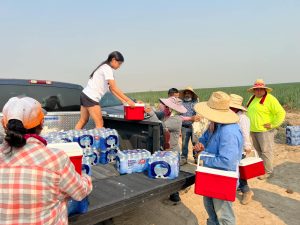
New study reveals farmworker pesticide exposure in Idaho. The study by Boise State University in collaboration with Idaho Organization of Resource Councils Director Irene Ruiz, reveals that Latinx farmworkers in Idaho have traces of various pesticides in their urine samples. This alarming discovery highlights significant barriers to protecting farmworkers from pesticide exposure and confirms the fears of many farmworkers in Idaho who have suspected this and have been vocal about wanting safer working conditions.
Key Issues Identified:
- Barriers to Personal Protective Equipment (PPE): Farmworkers often face obstacles in using PPE, such as extreme heat and a belief that PPE is not essential, especially among men. These barriers undermine efforts to safeguard health and safety.
- Concerns About Pesticide Drift: Many farmworkers express worry about pesticide drift from nearby farms and lack of adequate notification when pesticides are applied. This uncertainty exacerbates their risk of exposure.
- Demand for Better Training: Farmworkers have voiced a need for more interactive and in-person safety training sessions. They believe that these types of training would be more effective in addressing their safety concerns and improving their overall awareness.
- Regulatory Gaps: Current regulations may fall short of addressing the specific concerns and challenges faced by farmworkers. Even farms that comply with legal requirements may not fully meet the needs of their workers.
It’s crucial to address these issues to ensure farmworker safety and health. Enhancing PPE accessibility, improving communication about pesticide applications, and updating training and regulations to better reflect farmworkers’ needs are essential steps toward a safer working environment.
Let’s advocate for meaningful changes and support farmworkers in their fight for safer working conditions. Read more here: Addressing Pesticide Exposure and Safety Concerns Among Farmworkers



